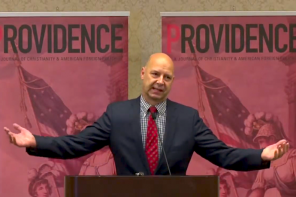When I learned that House Minority Leader Nancy Pelosi called Monday for a House ethics committee to investigate whether Rep. Anthony Weiner violated any of the chamber’s rules by tweeting lewd photographs of himself, I thought, Hey, Ms. Pelosi, if all it takes is a tweeted photograph for you to hold someone accountable, then I have some other “lewd” photographs for you to look at, and I’d be more than happy to open a Twitter account so I can send them to you.
There seems to be an enthusiastic eagerness to hold—or at least to pretend to hold—philandering men accountable for their adulterous behavior, and to be sure, there’s been a never-ending parade of them for us to wag our fingers at—Clinton, Spitzer, Ensign, Pickering, Edwards, Sanford, Schwarzenegger, and now Weiner. I have no doubt there will be more to come (pun intended). We are quite willing to punish people for personal sins, especially when they are sexual in nature, but we seem unwilling to hold anyone accountable for structural, institutional sins, which are, it seems to me, the sins that matter in government—sins like giving tax breaks to wealthy corporations, or eviscerating social programs that benefit the most vulnerable among us, or destroying the environment, or starting a war on falsified intelligence, or authorizing torture.
It’s much easier, of course, to hold someone accountable for something that you believe has nothing to do with you. But it takes courage to hold someone accountable for doing something that also implicates you. Perhaps structural sins are harder to prosecute because they demand something of the rest of us: that we look at how our own behavior contributes to injustice, to bloodshed, to pain.
Feminist theologians have long pointed out the need to think critically about what is and isn’t called a sin. Naming sins is an enterprise engaged in by the powerful, and it has real effects on those deemed “sinners.” Labeling something a “sin” often works as a bait and switch, distracting people from naming the violence and injustices that really matter. It was pretty convenient for patriarchal religious authorities to call “pride” a sin and “humility” a virtue, pretty savvy to make it a sin for women to speak up and speak out in church, pretty calculating to call submission a godly obligation and resistance an abomination. Those with the power to name what counts as a crime rarely end up in jail.
So here’s my proposal, Ms. Pelosi: If I tweet you the photographs taken by American soldiers of the torture that took place at Abu Ghraib prison in Iraq, will you call for a House ethics committee to investigate those who authorized that torture? I’m also more than happy to tweet you the link to the torture memos in case you need to read those again to make your case to Congress. Do we have a deal?




